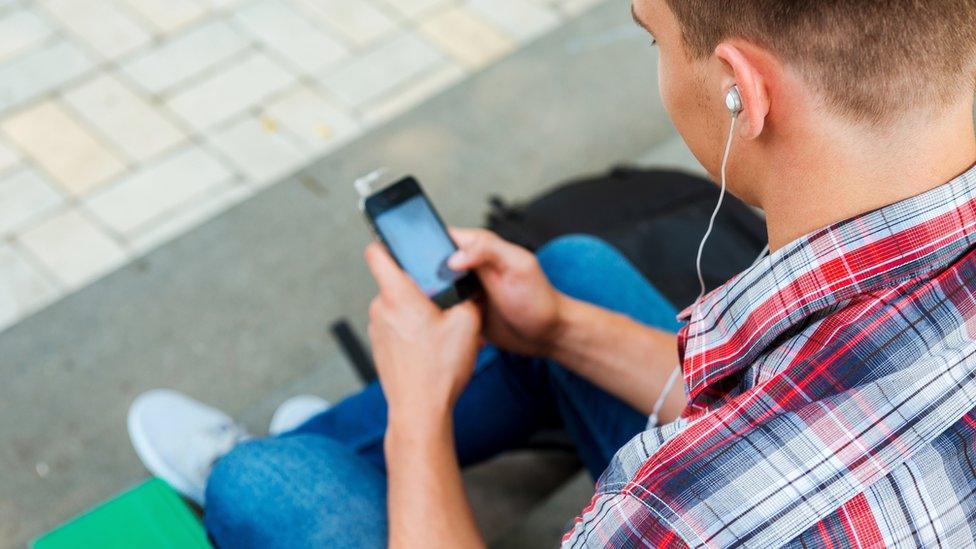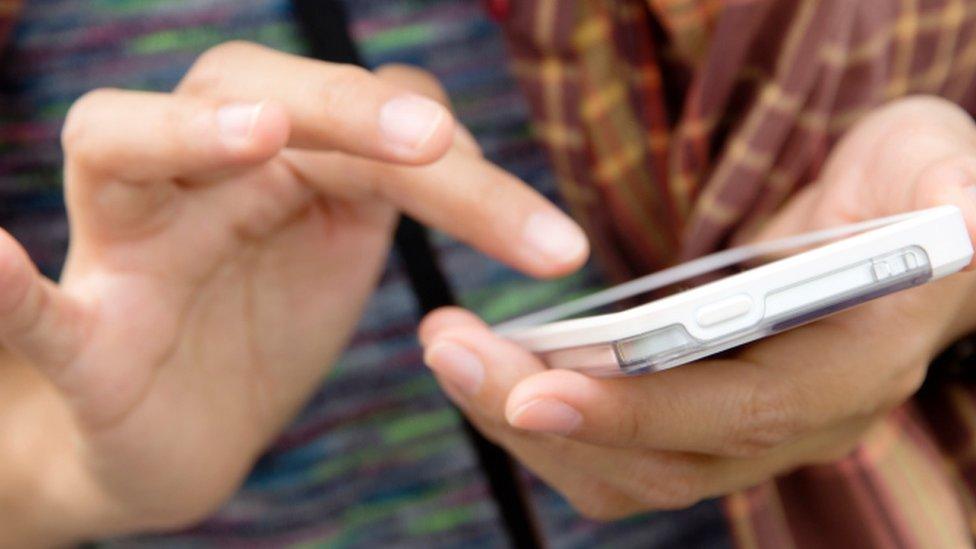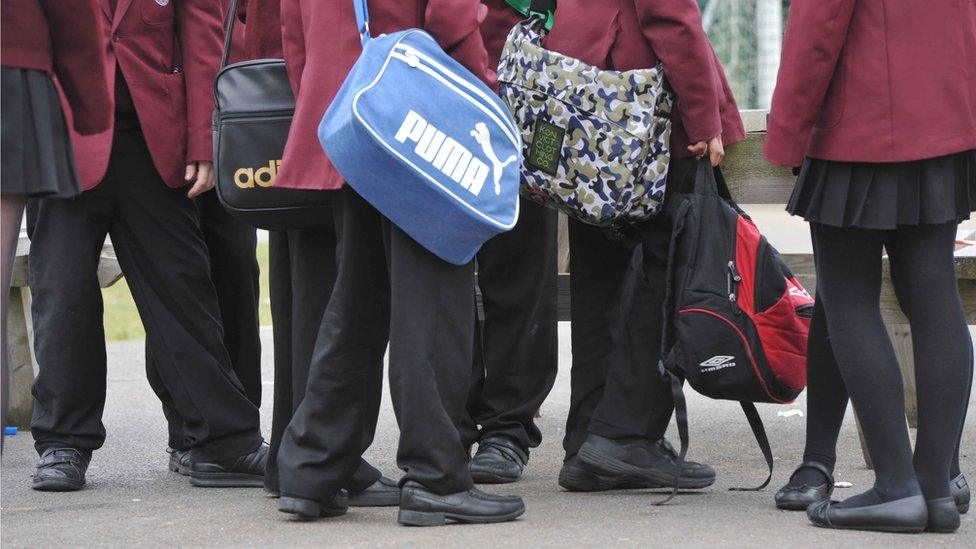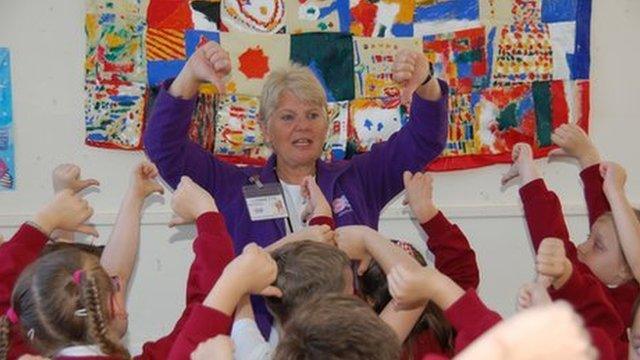Pornography 'desensitising young people'
- Published

Most children are exposed to online pornography by their early teenage years, a study warns.
About 53% of 11- to 16-year-olds have seen explicit material online, nearly all of whom (94%) had seen it by 14, the Middlesex University study says.
The research, commissioned by the NSPCC and the children's commissioner for England, said many teenagers were at risk of becoming desensitised to porn.
The government said keeping children safe online was a key priority.
Naked images
The researchers questioned 1,001 children aged 11 to 16 and found 65% of 15- to 16-year-olds reported seeing pornography, as did 28% of 11- to 12-year-olds.
They also discovered that it was more likely for the youngsters to find material accidentally (28%), for example via a pop-up advertisement, than to specifically seek it out (19%).
More than three-quarters of the children surveyed - 87% of the boys and 77% of the girls - felt pornography failed to help them understand consent, but most of the boys (53%) and 39% of girls saw it as a realistic depiction of sex.
Some of the children's approach to sex was also informed by pornographic scenes, with more than a third (39%) of the 13- to 14-year-olds and a fifth of the 11- to 12-year-olds boys saying they wanted to copy the behaviour they had seen.
The report also found:
More boys than girls had viewed online pornography through choice
135 (14%) of the young people who responded had taken naked and/or semi-naked images of themselves, and just over half of these (7% overall) had shared these images
Of those children who reported seeing online pornography, the greatest proportion (38%) had first seen it on a portable laptop, 33% through a mobile phone and just under a quarter (24%) on a desktop computer
Nearly 60% of the children and young people surveyed who had seen online pornography reported seeing it for the first time at home, followed by 29% who reported doing so at a friend's house
The report is published a week after expert witnesses told the Women and Equalities Committee that girls were wearing shorts under their school skirts to avoid sexual harassment and warned that online pornography was giving children unacceptable messages about sex and intimacy.

Young people's concerns
One 11-year-old girl told researchers: "I didn't like it because it came on by accident and I don't want my parents to find out and the man looked like he was hurting her. He was holding her down and she was screaming and swearing."
A 13-year-old boy said: "One of my friends has started treating women like he sees on the videos - not major - just a slap here or there."
"It can make a boy not look for love, just look for sex, and it can pressure us girls to act and look and behave in a certain way before we might be ready for it," said one 13-year-old girl.
Another 13-year-old girl said: "A few of my friends have used it for guidance about sex and are getting the wrong image of relationships."

Dr Elena Martellozzo, who co-led the research, said: "Although many children did not report seeing online pornography, it is worrying that some children came across it accidentally and could be sent it without seeking it.
"If boys believe that online pornography provides a realistic view of sexual relationships, then this may lead to inappropriate expectations of girls and women.
"Girls too may feel pressured to live up to these unrealistic, and perhaps non-consensual, interpretations of sex.
"There is a huge task ahead for parents, teachers and policymakers.
"We found that children and young people need safe spaces where they can freely discuss the full range of issues related to sex, relationships and the accessibility of online porn in the digital age."

Anne Longfield, Children's Commissioner for England, said it was worrying that many children were exposed to pornography.
"Only now are we beginning to understand its impact on 'smartphone kids' - the first generation to have been raised with technology that's taken the internet from the front room, where parents can monitor use, to their bedrooms or the playground, where they can't," she said.
"We know from the research that very many children are shocked, confused or disgusted by what they see, and it is our duty to help them to question, challenge and make sense of it."
NSPCC chief executive Peter Wanless said: "A generation of children are in danger of being stripped of their childhoods at a young age by stumbling across extreme and violent porn online.
"Industry and government need to take more responsibility to ensure that young people are protected.
"Some companies have taken the initiative when it comes to online safety, and we will continue to put pressure on those that have not yet done so.
"Age-appropriate sex and relationship education in schools, dealing with issues such as online pornography and children sending indecent images, are crucial."
A Department for Culture, Media and Sport spokeswoman said: "Keeping children safe online is one of government's key priorities.
"Just as we do offline, we want to make sure children are prevented from accessing pornographic content online, which should only be viewed by adults.
"In the forthcoming Digital Economy Bill, we will bring in legislation that will require companies providing pornographic material online to make sure they have a robust age-verification system in place, so that those accessing their websites are over 18."
- Published7 June 2016

- Published22 March 2016
